- This is a chronological list of Australian films by decade and year for years 1980s. For a complete alphabetical list, see Category:Australian films .
A list of films produced in Australia by year during the 1980s, in the List of Australian films.
A list of films produced in Australia by year during the 1980s, in the List of Australian films.

The cinema of Australia had its beginnings with the 1906 production of The Story of the Kelly Gang, arguably the world's first feature film. Since then, Australian crews have produced many films, a number of which have received international recognition. Many actors and filmmakers with international reputations started their careers in Australian films, and many of these have established lucrative careers in larger film-producing centres, such as the United States.
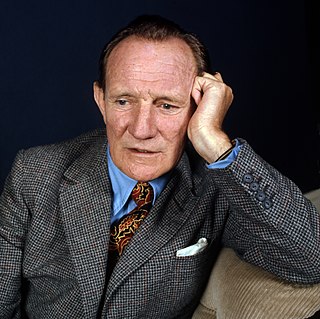
Trevor Wallace Howard-Smith was an English stage, film, and television actor. After varied work in the theatre, he achieved star status with his role in the film Brief Encounter (1945), followed by The Third Man (1949). He is also known for his roles in Golden Salamander (1950), The Clouded Yellow (1951), Mutiny on the Bounty (1962), The Charge of the Light Brigade (1968), Battle of Britain (1969), Lola (1969), Ryan's Daughter (1970), Superman (1978), Windwalker (1981), and Gandhi (1982). For his performance in Sons and Lovers (1960) he was nominated for the Academy Award for Best Actor.

Jack Thompson, AM is an Australian actor and a major figure of Australian cinema, particularly Australian New Wave. He was educated at University of Queensland, before embarking on his acting career. In 2002, he was made an honorary member of the Australian Cinematographers Society (ACS). He is best known as a lead actor in several acclaimed Australian films, including such classics as The Club (1980), Sunday Too Far Away (1975), The Man from Snowy River (1982) and Petersen (1974). He won Cannes and AFI acting awards for the latter film. He was the recipient of a Living Legend Award at the 2005 Inside Film Awards.

The Adventures of Priscilla, Queen of the Desert is a 1994 Australian road comedy film written and directed by Stephan Elliott. The plot follows two drag queens, played by Hugo Weaving and Guy Pearce, and a transgender woman, played by Terence Stamp, as they journey across the Australian Outback from Sydney to Alice Springs in a tour bus that they have named "Priscilla", along the way encountering various groups and individuals. The film's title references the slang term "queen" for a drag queen or female impersonator.

Bruce Beresford is an Australian film director who has made more than 30 feature films over a 50-year career. Notable films he has directed include Breaker Morant (1980), Tender Mercies (1983), Crimes of the Heart (1986) and the multiple Academy Award winning Driving Miss Daisy (1989).
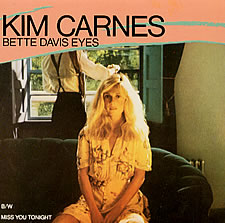
"Bette Davis Eyes" is a song written and composed by Donna Weiss and Jackie DeShannon in 1974. It was originally recorded by DeShannon in that year for her album New Arrangement, but it was made popular by American singer Kim Carnes in 1981 when it spent nine non-consecutive weeks on top of the U.S. Billboard Hot 100. The song was #1 for five weeks but was interrupted for one week by "Stars on 45" before it returned to the top spot for another four weeks and became Billboard's biggest hit of the year. The single also reached No. 5 on Billboard's Top Tracks charts and No. 26 on the Dance charts. It was also a No. 1 hit in 21 countries and peaked at No. 10 in the United Kingdom, to date her only Top 40 hit in that country. It also reached No. 2 in Canada for twelve consecutive weeks, and was the No. 2 hit of 1981 in that country after "Stars on 45".

"Fame" is a pop song, written by Michael Gore (music) and Dean Pitchford (lyrics) and released in 1980, that achieved chart success as the theme song to the Fame film and TV series. The song was performed by Irene Cara, who played the role of Coco Hernandez in the original film. It was also her debut single as a recording artist. The song won the Academy Award for Best Original Song in 1980, and the Golden Globe Award the same year. In 2004, it finished at number 51 on AFI's 100 Years...100 Songs survey of top tunes in American cinema.
Robert James Ellis was an Australian writer, journalist, filmmaker, and political commentator. He was a student at the University of Sydney at the same time as other notable Australians including Clive James, Germaine Greer, Les Murray, John Bell, Ken Horler, Robert Hughes and Mungo McCallum. He lived in Sydney with the author and screenwriter Anne Brooksbank; they had three children.
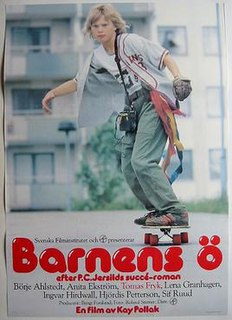
Children's Island is a Swedish drama film which was released to cinemas in Sweden on 25 December 1980, directed by Kay Pollak, starring Thomas Fryk and Ingvar Hirdwall. It is based on the novel of the same name by P. C. Jersild. Filming took place between July and October 1979. It won Sweden's most prestigious film prize, the Guldbagge, when it was released in 1980 and was Sweden's official selection for the 54th Academy Awards. The film became controversial in Australia, being banned in 2014, over thirty years after its original release.
This is an index of lists of films by year, awards, countries of origin and genre among other factors.
The Australian New Wave was an era of resurgence in worldwide popularity of Australian cinema, particularly in the United States. It began in the early 1970s and lasted until the mid-late 1980s. The era also marked the emergence of Ozploitation, a film genre characterised by the exploitation of colloquial Australian culture.
The AACTA Award for Best Film is an award presented by the Australian Academy of Cinema and Television Arts (AACTA), a non-profit organisation whose aim is to "identify, award, promote, and celebrate Australia's greatest achievements in film and television". The award is presented at the annual AACTA Awards, which hand out accolades for achievements in feature film, television, documentaries and short films. From 1969 to 2010, the category was presented by the Australian Film Institute (AFI), the Academy's parent organisation, at the annual Australian Film Institute Awards. When the AFI launched the Academy in 2011, it changed the annual ceremony to the AACTA Awards, with the current award being a continuum of the AFI Award for Best Film.
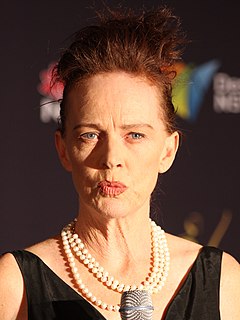
The AACTA Award for Best Actress in a Leading Role is an award presented by the Australian Academy of Cinema and Television Arts (AACTA), a non-profit organisation whose aim is to "identify, award, promote, and celebrate Australia's greatest achievements in film and television".
The Australian Film Institute Award for Best Screenplay was an award presented intermittently by the Australian Film Institute (AFI), for an Australian screenplay written directly for the screen or based on previously released or published material. It was handed out at the Australian Film Institute Awards, which are now the AACTA Awards after the establishment of the Australian Academy of Cinema and Television Arts (AACTA), by the AFI. The award was handed out from 1975-1977, 1980-1982, 1990-1992, and again in 2007; two separate awards were created for "Best Adapted Screenplay" and "Best Original Screenplay" and have been presented intermittently from 1978-1979, 1983-1989, 1993-2006, and then from 2008, onwards. The award was first presented at the 1974-75 awards as a film prize which included a cash reward of $A1000.
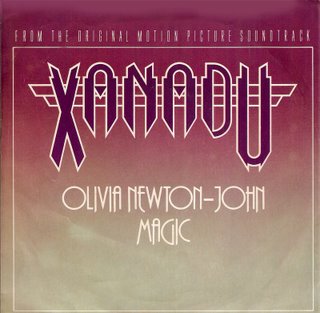
"Magic" is a song recorded by Australian singer Olivia Newton-John for the soundtrack to the 1980 film Xanadu. Written and produced by John Farrar, it was released as the lead single from the soundtrack on 23 May 1980. The single was number one on the US Billboard Hot 100 for four weeks beginning on August 2, 1980. On August 30, it was displaced from the top by "Sailing" by Christopher Cross.
The APRA Music Awards in Australia are annual awards to celebrate excellence in contemporary music, which honour the skills of member composers, songwriters, and publishers who have achieved outstanding success in sales and airplay performance.
The AACTA Award for Best Screenplay in Television is an award presented by the Australian Academy of Cinema and Television Arts (AACTA), a non-profit organisation whose aim is to "identify, award, promote and celebrate Australia's greatest achievements in film and television." The award is presented at the annual AACTA Awards, which hand out accolades for achievements in feature film, television, documentaries and short films. From 1986 to 2010, the category was presented by the Australian Film Institute (AFI), the Academy's parent organisation, at the annual Australian Film Institute Awards. When the AFI launched the Academy in 2011, it changed the annual ceremony to the AACTA Awards, with the current award being a continuum of the AFI Award for Best Screenplay in Television.
The AACTA Award for Best Original Screenplay is an award presented by the Australian Academy of Cinema and Television Arts (AACTA), for an Australian screenplay "written directly and originally for the screen". Prior to the establishment of the Academy in 2011, the award was presented by the Australian Film Institute (AFI) at the annual Australian Film Institute Awards. It was first handed out in 1978 when the award for Best Screenplay was split into two categories: Best Original Screenplay and Best Adapted Screenplay. The award has since been presented intermittently from 1978-1979, 1983-1987, 1989, 1993-2006, and then from 2008-present.
The AACTA Award for Best Adapted Screenplay is an award presented by the Australian Academy of Cinema and Television Arts (AACTA), for an Australian screenplay "based on material previously released or published". Prior to the establishment of the Academy in 2011, the award was presented by the Australian Film Institute (AFI) at the annual Australian Film Institute Awards. It was first handed out in 1978 when the award for Best Screenplay was split into two categories: Best Original Screenplay and Best Adapted Screenplay. The award has since been presented intermittently from 1978–1979, 1983–1987, 1989, 1993–2003, 2005–2006, and then from 2008–present.